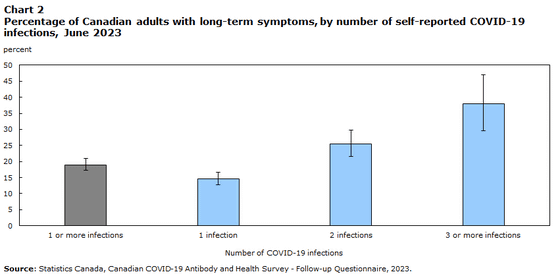The more times you have been infected with the new coronavirus, the higher your risk of Long COVID.

Thanks to vaccines, the fatality rate for people who contract COVID-19 is much lower than it was at the beginning of the pandemic. However, multiple studies have shown that even if COVID-19 appears to be mild, if symptoms occur multiple times, the risk of developing
Every COVID Infection Increases Your Risk of Long COVID, Study Warns : ScienceAlert
https://www.sciencealert.com/every-covid-infection-increases-your-risk-of-long-covid-study-warns

There are many studies on 'long COVID,' in which symptoms such as fatigue, shortness of breath, and decline in cognitive function due to COVID-19 continue for several months. It has become clear that there are genes that increase the risk of developing the disease , and that there are cases in which the decline in cognitive function due to long COVID lasts for more than two years .
Although the risk of developing Long COVID is relatively low for 'vaccinators' and 'young people,' the more times you get sick with COVID-19, the more likely you are to develop a variety of health problems, including Long COVID. It is clear that there is a possibility that

In an official podcast
Long COVID is known to have devastating effects on various organs and is therefore defined as a multisystem disease with potentially lifelong consequences. Among people infected with SARS-CoV-2, the prevalence of Long COVID varies greatly depending on the study and study area, but it has been reported to be around 10-50% .
A study published in January 2023 estimated that 65 million people worldwide are suffering from Long COVID. Fortunately, children are far less affected than adults, but that doesn't mean they are completely immune to the effects of Long COVID.

To analyze the impact of Long COVID in more detail, epidemiologist Benjamin Bow and colleagues conducted
Bow et al.'s study focused on American veterans, so this trend may not apply to everyone. However, this is not the only study showing concern with multiple COVID-19 infections. A study of people 18 and older in 10 Canadian provinces also found that the more people are infected with COVID-19, the more likely they are to develop Long COVID.
The graph below summarizes the number of times people were infected with COVID-19 and the incidence rate of Long COVID. The long COVID morbidity rate in the case of '1 infection' is 14.6%, the long COVID morbidity rate in the case of '2 infections' is 25.4%, and '3 or more infections (infected with COVID-19 three or more times), the Long COVID morbidity rate is 37.9%, meaning that the risk of developing Long COVID increases as the number of times you are infected with COVID-19 increases. You can see.

Sian Quan, a statistician at McGill University who led the study, said, ``This study adds to new evidence regarding the link between COVID-19 reinfection and long COVID.''
Another study, which has not yet been peer-reviewed , used medical data from 1.5 million people in the United States to compare the severity of initial COVID-19 and subsequent infections. This study also confirmed that variants following the Delta and Omicron strains of SARS-CoV-2 increase the incidence of Long COVID after reinfection with COVID-19. However, it is unclear whether the increased incidence of Long COVID is due to ``multiple COVID-19 infections'' or ``the effects of mutant strains of SARS-CoV-2.''
SARS-CoV-2 is also known to alter the human immune system, and has also been shown to destroy memory T cells needed for long-term immunity. It was also found that SARS-CoV-2 destroys memory T cells, whether the symptoms of COVID-19 are mild or severe. It has also been pointed out that long COVID may increase the risk of infection with pneumonia and RSV .
Related Posts:
in Science, Posted by logu_ii







